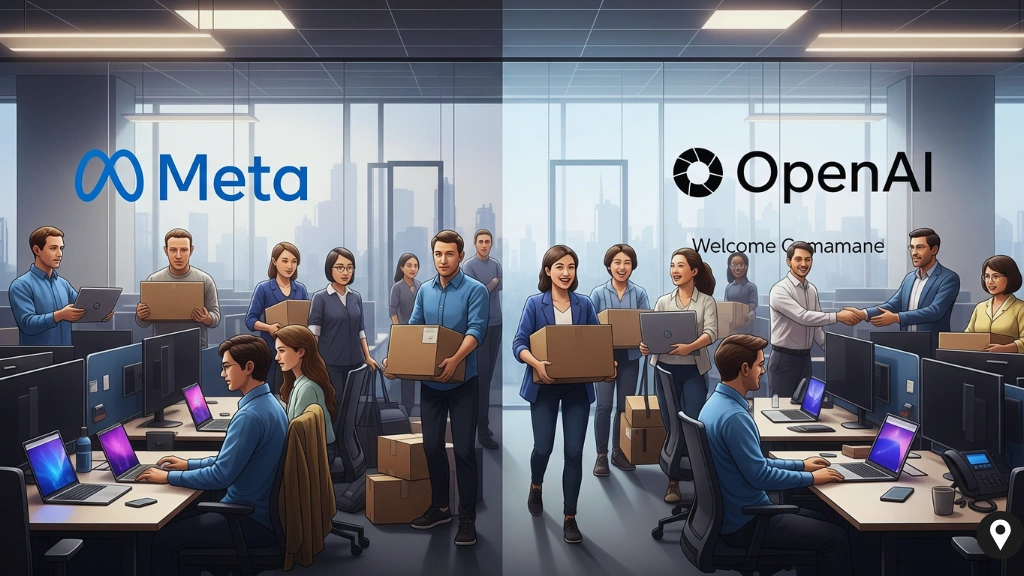Meta’s AI lab faces major talent exits as top researchers quit despite massive pay, with several heading back to OpenAI.

When Mark Zuckerberg launched Meta’s Superintelligence Labs (MSL) earlier this year, it was introduced as a bold step to compete with OpenAI and Google DeepMind in the race toward advanced artificial intelligence.
But just months later, cracks are showing. Despite the massive pay packages, several high-profile researchers have quit, and some are even returning to OpenAI. The exits highlight a deeper truth in AI: money alone cannot guarantee loyalty or vision.
Key departures from Meta’s AI lab
According to Wired, at least three well-known researchers have recently walked away from Meta’s AI moonshot:
- Avi Verma and Ethan Knight, who previously worked at OpenAI, have quit Meta and are returning to their old company.
- Rishabh Agarwal, an Indian researcher previously with Google DeepMind, also left after just a few months. Rishabh Agarwal, who joined Meta in April with a reported $1 million package, revealed in August that it would be his last week at the company.
Yet he said he wanted to pursue “a different kind of risk” after more than seven years at Google Brain, DeepMind, and Meta.
For many observers, the symbolism was striking – Meta’s own recruits were now using Zuckerberg’s words to justify their exit.
Why top researchers are leaving
While Verma and Knight did not publicly comment, industry insiders point to several factors. Meta’s AI efforts have faced shifting priorities, frequent reorganizations, and heavy top-level oversight. Recently, the company split its AI teams into four groups, creating further uncertainty within MSL.
Other voices in the industry have echoed similar concerns. Anthropic cofounder Benjamin Mann once remarked:
“As one Anthropic cofounder put it, the company’s highest ambition is shaping humanity’s future, whereas at Meta the end goal feels more about profit.”
For many researchers, this highlights a key divide: while money matters, mission and influence matter more. DeepMind cofounder Demis Hassabis has argued that top AI researchers aim to guide the safe development of the technology, not simply chase high salaries.
OpenAI benefits from Meta’s losses
The timing of these exits couldn’t be better for OpenAI. Joining Verma and Knight, senior Meta executive Chaya Nayak has also moved to OpenAI, ending almost ten years with Zuckerberg’s team.
This is ironic, considering OpenAI had previously criticized Meta’s aggressive recruitment tactics as “distasteful.” Now, it is OpenAI that benefits from researchers who decided mission and culture outweigh big pay offers.
What this means for Meta
Meta has poured enormous resources into MSL, even bringing in high-profile names like Alexandr Wang (Scale AI) and Nat Friedman (former GitHub CEO) to strengthen leadership. But the resignations raise doubts about whether a high salary is enough to hold together a frontier AI team.
For Zuckerberg, the irony is hard to ignore. He built his public image as a visionary risk-taker, yet now his own recruits are quoting his philosophy as they walk away. Meta’s ability to steady its AI lab or keep losing top talent could shape how it fares in the next stage of the AI race.
A wider AI talent competition
Meta is not alone in this struggle. Across Silicon Valley, the fight for AI talent has intensified. Elon Musk’s xAI has reportedly poached at least 14 engineers from Meta this year, offering less in pay but more in equity and speed-driven culture.
Industry leaders worry this “salary arms race” could create a toxic environment, dividing researchers between money-focused roles and mission-driven work.
Beyond the labs: AI’s impact on jobs
This turbulence in AI research connects to a larger story about how artificial intelligence is transforming the workforce. A Stanford study recently revealed that entry-level jobs in AI-exposed fields such as software engineering, marketing, and customer support are disappearing the fastest.
Employment for younger workers (ages 22–25) has dropped sharply, while older workers have fared better. Experts warn that this erosion of “first rung” jobs could destabilize career pathways for an entire generation.
Last Words
Meta’s push into superintelligence was meant to project confidence, but the wave of departures reveals how fragile even billion-dollar projects can be. For the brightest AI minds, purpose, influence, and trust seem to outweigh even the biggest salaries.
And for Zuckerberg, the challenge is now clear: in the AI talent competition, no paycheck is big enough without stability and mission.
Also Read: Meta Hires 24-Year-Old Matt Dyke with Record $250M AI Job Offer
